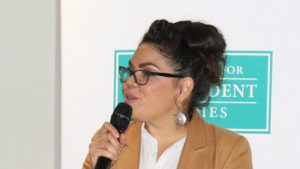Home » Commentary » Opinion » Real solutions for Indigenous problems
· Ideas@TheCentre
 The vast majority of Australians — including many Australians of Aboriginal descent — know very little of the reality of the situation on remote communities and the extent to which aspects of traditional culture play a significant role in the acceptance of interpersonal violence which in turn perpetuates the crisis.
The vast majority of Australians — including many Australians of Aboriginal descent — know very little of the reality of the situation on remote communities and the extent to which aspects of traditional culture play a significant role in the acceptance of interpersonal violence which in turn perpetuates the crisis.
Nor are Aboriginal people who struggle with poor education and live within the confines of traditional culture capable of articulating to the wider Australian community the contrasting differences between traditional culture and the functions of a modern Australian society — based on democracy and the upholding of individual human rights.
What has become increasingly apparent to me is that there is one standard for the majority of Australians — and then there is a lowered standard for Indigenous Australians, which is aggressively driven by the left.
This lowered expectation for Indigenous Australians works to keep disadvantage in place — to entrench it. Rather than it giving us an ‘easier path’ — as some people claim they are trying to do — it prevents us from realising our personal and community agency in our own futures.
We are in a time where common sense is needed now more than ever. Ideology is driving the current politically correct narrative that Indigenous Australians require continual placation in order to close the gap.
The current narrative demands that symbolic gestures take priority over the implementation of practical solutions in order that marginalized Indigenous Australians may overcome their disadvantage.
We live in an era of smoke and mirrors where an industry has arisen that purports to be helping Indigenous Australia — and yet while increasing sums are spent, the promised outcomes are nowhere in sight.
Why has this happened? Because somewhere within our country’s consciousness, a shift has taken place, which has triggered an obsession with our country’s historical injustices toward Indigenous Australians — and a blindness about the real problems that abound today.
I believe it all accelerated after Rudd’s great act of symbolism with the apology. The apology focused on the Stolen Generation but failed to acknowledge those who were left behind… Left ‘on country’ with no jobs, but access to welfare and alcohol — and out of sight and out of mind for the rest of Australia.
It was the Aboriginal Ordinance of 1954 all over again, where people of mixed heritage could apply to be exempt from Ordinance but Aboriginal people of full descent continue to remain in poverty — without education, without jobs, without normal access to services — and continually told by those without traditional culture that it is their culture that will save them.
My mission — CIS’s mission — is to change the narrative. The current narrative ensures the misery of the most marginalised Aboriginal Australians continues.
As long as we continue to be sidelined by arguments for the need of more symbolism — changing the date, replacing the anthem, finding racism where it does not exist — the real issues will not be solved.
The new Indigenous Program at CIS will build on the research by the late and eminent scholar, Helen Hughes.
Building on Helen’s previous research in the area of education will be one of our first tasks. Remote Australian children have the lowest attendance rates in the nation and the lowest educational outcomes compared to the rest of Australia.
Indigenous Incarceration and its relationship with family violence is another priority the program will address.
We will also research which institutions and processes are hindering economic development — and whether the Land Rights Act should be reviewed in order that traditional owners can actually take real ownership of their land to enable economic prosperity.
The common sense that has been a hallmark of CIS policy research, and the commitment to bettering the lives of all Australians —including Indigenous Australians — means we will focus on practical and real solutions for problems that have been ignored for far too long.
This is an edited extract of a speech given at CIS this week to launch the Indigenous Research Program.
Real solutions for Indigenous problems